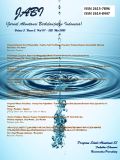PENGARUH CORPORATE SOCIAL RESPONSIBILITY, KUALITAS AUDIT DAN UKURAN PERUSAHAAN TERHADAP CORPORATE SUSTAINABILITY REPORTING
DOI:
https://doi.org/10.32493/JABI.v3i2.y2020.p117-128Keywords:
Corporate Social Responsibility, Kualitas Audit, SIZE, Corporate Sustainibility ReportingAbstract
This study aimed to get empirical evidence about the influence of Corporate Social Responsibility Disclosure and Quality Audit to Corporate Sustainability Reporting. Corporate Social Responsibility Disclosure was proxied by CSRDI (Corporate social responsibility disclosure index) based on indicators GRI 2016. Audit quality was proxied by big-four accounting firm or non big-four and measured by a dummy variable. The level of Corporate Sustainability Reporting disclosure measured through Sustainability Report Disclosure Index (SRDI) is expressed by comparing the number of disclosures by the company with a number of standar disclosure of the Global Reporting Initiative (GRI) 2016 index. The type of research is an associative quantitative research with the determination of samples testing purposive sampling method, of obtaining samples based on certain criteria. The data used is secondary data collected through companies listed on The Indonesia Stock Exchange. Hypothesis testing is done by technique, classic assumption test analysis and multiple linear regression test analysis used in this study to answer the main problem of research. The data collecied, then processed and analyzed using the program SPSS 25.0 for windows. The result of this study indicate that Corporate Social Responsibility has a significant positive effect on Corporate Sustainability Reporting. Audit Quality has no significant positive effect on Corporate Sustainability Reporting. SIZE has no significant positive effect on Corporate Sustainability Reporting. Simultaneous hypothesis testing shows that Corporate Social Responsibility, Audit Quality and SIZE together have a significant positive effect on Corporate Sustainability Reporting.
References
Andriyanto, R., Effriyanti, E., & Hidayat, A. (2018). The Effect of Spiritual Intelligence (SQ) and Personality Types on Auditor’s Ability to Detect Fraud. JABI (Jurnal Akuntansi Berkelanjutan Indonesia), 1(3), 258-268.
Anis, C., & Ghozali, I. (2001). Teori Akuntansi. In Edisi Pertama.
Arikunto. (2006). Prosedur Penelitian Suatu Pendekatan Praktik. In Ed Revisi VI. jakarta: PT Rineka Cipta.
Drs. Amin Widjaja Tunggal, A. C. (2013). POKOK-POKOK AUDITING & JASA ASURANS. JAKARTA: HARVARINDO.
Ikatan Akuntansi Indonesia.. (2009). Standar Akuntansi Keuangan. Jakarta: Salemba Empat.
Sugiyono. (2006). Statistika untuk Penelitian. In Cetakan Ketujuh. Bandung: CV. Alfabeta.
Sugiyono. (2010). Metode Penelitian Kuantitatif Kualitatif dan R&D . Bandung: Alfabeta.
Sugiyono.(2014). Metode Penelitian Pendidikan Pendekatan Kuantitatif, Kualitatif dan R&D. Bandung: CV. Alfabeta.
Ahmad, F. (2014). Pengaruh karakteristik Perusahaan dan Profitabilitas terhadap Pengungkapan Sustainibility Report.
Aziz, A. (2014). Analisis Pengaruh Good Corporate Governance (GCG) terhadap Kualitas Pengungkapan Sustainibility Report.
Fernaldy, M. F. (2016). The Impact of Profitability, Leverage and Size of Board Commissioner Toward Sustainibility Reporting Disclosure.
Hidayat, A., & Sadewa, P. (2020). Pengaruh Penggunaan Aplikasi Eviews Terhadap Sikap Belajar dan Kemampuan Pemecahan Masalah Statistik. Edumaspul: Jurnal Pendidikan, 4(1), 321-328.
Ibrahim, M. Y. (2016). Pengaruh pengungkapan Corporate Social Responsibilty dan Kualitas Audit terhadap Sustainibility Reporting.
Maharani, S. N. (n.d.). Sustainibility Reporting sebagai Media Perusahaan dalam Menegmbangkan dan melaporkan Kebijakan Bisnis Berkelanjutan.
Mulkhan, U. d. (2011). Peran Pemerintah dalam Kebijakan Corporate Social Responsibility (CSR) dalam Upaya mendorong Pembangunan Berkelanjutan (Sustainibility Development) . Jakarta: Jurnal Ilmiah Aministrasi Publik dan Pembangunan, Vol.2, No.1, Januari-Juni 2011.
Nugraha, B. (2015). The Influence of Good Corporate Governance (GCG) Implements Toward Quality Sustainibility Reporting (SR) .
Prastiwi, H. S. (2011). Pengaruh karakteristik Perusahaan dan Corporate Governance terhadap Praktik Pengangkapan Sustainibility Report.
Putri, C. D. (2013). Pengaruh Corporate Governance dan Karakteristik Perusahaan terhadap Tanggung jawab Sosial Perusahaan didalam Sustainibility Report.
Rohmah, D. (2015). Pengaruh Mekanisme Corporate Governance, Ukuran Perusahaan dan Profitabilitas Perusahaan terhadap Pengungkapan Corporate Social Responsibilty didalam Laporan Sustainibility. Putri, 2.
Ryandi Iswandika, M. &. (2014). Pengaruh Kinerja Keuangan, Corporate Governance, dan Kualitas Audit terhadap Pengungkapan Corporate Social Responsibility . Jakarta: JUrnal Akuntansi Fakultas Ekonomi Universitas Trisakti.
Saputro, T. S. (2016). Pengaruh Kualitas Audit dan Corporate Social Responsibilty terhadap Tax Avoidance.
The Impact of Environmental Performance, Profitability and Leverage Toward Sustainibility Reporting Disclosure. (2017).
Peraturan Pemerintah No. 47 Tahun 2012, Tentang Tanggung Jawab Sosial dan Lingkungan Perseroan Terbatas
Undang-Undang No. 40 Tahun 2007, Tentang Perseroan Terbatas
Undang-Undang No. 25 Tahun 2007, Tentang Penanaman Modal
Undang-Undang No. 32 Tahun 2009, Tentang Perlindungan Dan Pengelolaan Lingkungan Hidup
Widianto, H. S. (2011). Pengaruh Profitabilitas, Likuiditas, Leverage, Aktivitas, Ukuran Perusahaan dan Corporate Governance terhadap Praktik Pengungkapan Sustainibility Reporting. Semarang: Universitas Diponegoro.
William. (2012). Pengaruh Pengungkapan Corporate Social Responsibility Berdasarkan Pedoman Global Reporting Initiative Terhadap Nilai Perusahaan. Jakarta: Universitas Indonesia.
Published
Issue
Section
License
Authors who publish with this journal agree to the following terms:
- Authors retain copyright and grant the journal right of first publication with the work simultaneously licensed under a Creative Commons Attribution License that allows others to share the work with an acknowledgement of the work's authorship and initial publication in this journal.
- Authors are able to enter into separate, additional contractual arrangements for the non-exclusive distribution of the journal's published version of the work (e.g., post it to an institutional repository or publish it in a book), with an acknowledgement of its initial publication in this journal.
- Authors are permitted and encouraged to post their work online (e.g., in institutional repositories or on their website) prior to and during the submission process, as it can lead to productive exchanges, as well as earlier and greater citation of published work (See The Effect of Open Access)

This work is licensed under a Creative Commons Attribution-ShareAlike 4.0 International License.


 PUBLICATION ETHICS
PUBLICATION ETHICS FOCUS AND SCOPE
FOCUS AND SCOPE EDITORIAL TEAM
EDITORIAL TEAM REVIEW PROCESS
REVIEW PROCESS CONTACT US
CONTACT US AUTHOR GUIDELINES
AUTHOR GUIDELINES




